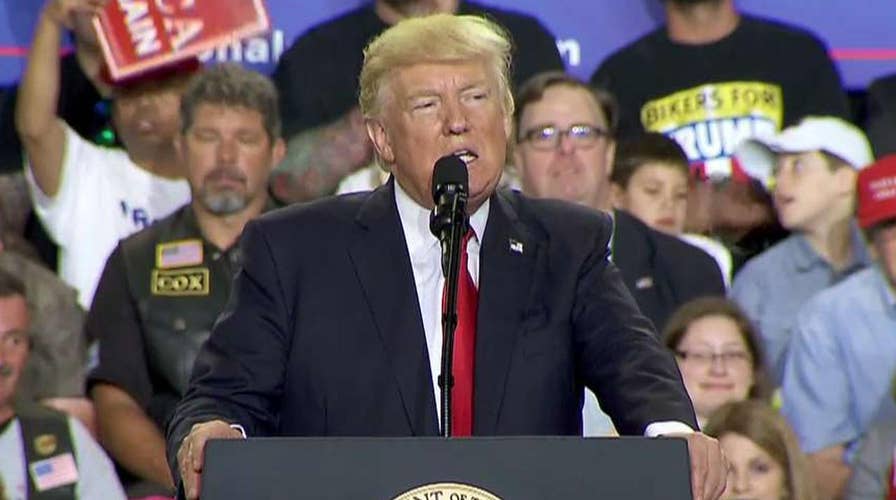Trump pledges to renegotiate or terminate NAFTA
Wall Street Journal reporter Will Mauldin provides insight
Blue skies welcomed Agriculture Secretary Sonny Perdue to Couser Cattle Company in central Iowa recently where he held a town hall meeting with farmers and others whose livelihoods depend on a strong farm economy. The newly minted head of the USDA explained that his chief job “is selling ag products across the world.”
That’s good news for rural America. Last year, across the Plains and Rust Belt, Middle America threw its support behind the candidate who brazenly thumbed his nose at the deplorable disregard political elites displayed toward those who earn a living with sweat equity. Those who work on the factory floor in Ohio, the assembly lines in Michigan, the coal mines of Kentucky and the farm fields of Iowa delivered the votes.
Locking the barn door on NAFTA and other trade agreements would deal a devastating blow to the president’s base of support and cast a dark cloud over the entire farm economy.
This year, by traveling to America’s Heartland just days after being sworn into office, the nation’s 31st USDA Secretary shows he’s putting a high priority on the issues affecting American agriculture. Secretary Perdue voiced unconditional support for renewable fuels, opening markets and advancing regulatory and tax reforms that will allow farmers and ranchers to better manage their operations and increase productivity to feed and fuel the world.
His candid remarks reflect a genuine passion for agriculture and foretell his role in the Trump administration. Hands down, Secretary Perdue will be a hands-on advocate for American agriculture. His advocacy can go a long way to advance President Trump’s promise of prosperity and opportunity for those left behind in the 21st century economy.
As Iowa’s senior U.S. senator and a lifelong family farmer, I have led the chorus for years at the nation’s policymaking tables to advance fair and free trade agreements that are vital to American agriculture. I’m glad Secretary Perdue is singing from the same song sheet and can influence the tune President Trump adopts when it comes to strengthening our trade agreements and opening new markets for our goods and services.
World trade brings a rising tide of prosperity, lifting more people than ever into the middle class. America has the best natural resources and the best human resources to forge the best century we’ve seen yet. It will depend on good economic policy that stands strong for free and fair flow of trade, implementing regulatory, tax and health care reforms, and paying down the debt.
That’s a tall order. The president can start with our neighbors. Modernizing the North American Free Trade Agreement (NAFTA) to improve fairness for U.S. producers makes sense.
Iowa is the leading producer of corn, soybeans, pork and eggs. In the previous two decades since passage of NAFTA, U.S. producers have benefited tremendously from an integrated system between Mexico, Canada and the United States.
U.S. farm exports to Mexico and Canada have risen exponentially since 1994, showering tens of billions of dollars into local economies that boost the financial health and prosperity of Americans working all along the food and fuel chain, from raw commodities to processed grains, meats and renewable fuels. Closing access to these vital trade routes would lead to swift economic harm that would echo across the entire rural economy, from farming to manufacturing, processing, trucking and retailing.
The president has made no secret about his central commitment to the American worker and creating an environment for good-paying jobs here in the United States. And that’s a good thing. But it would be short-sighted to undermine trade agreements that benefit U.S. producers and manufacturers who employ American workers and depend on these markets and supply chains to stay in business.
We need to keep in mind that protectionist moves by our government on Mexican sugar may harm the U.S. corn market, and actions on Canadian soft lumber to resolve dairy disputes could trigger a tit for tat trade spat. Trade agreements must ensure fairness for our exports. Creating jobs and growing the economy here at home will require savvy diplomacy and the enforcement of existing trade agreements to achieve consensus on market access and resolve anti-dumping disputes.
Why is it a big deal to strengthen trade agreements and open new markets?
Every third row planted in Iowa is export-dependent. Farmers need exports to make ends meet. Anything left after paying the bills and putting money into savings gets invested into next year’s production costs, livestock and machinery upgrades.
America’s heritage is rooted in agriculture. For more than two centuries, innovation and good stewardship have helped food producers to anchor our economy and improve our balance of trade. Agriculture not only provides a way of life for millions of Americans. Food security is national security. For these reasons and more, the White House has every reason to treat American agriculture with fairness and finesse.
That’s why I joined a letter along with 17 senators to newly confirmed U.S. Trade Representative Robert Lighthizer urging the Administration not to abandon NAFTA and the tremendous economic benefits fair trade brings to the economy.
Making improvements to NAFTA would unlock even more potential for productivity and prosperity in America’s heartland. Locking the barn door on NAFTA and other trade agreements would deal a devastating blow to the president’s base of support and cast a dark cloud over the entire farm economy.





















